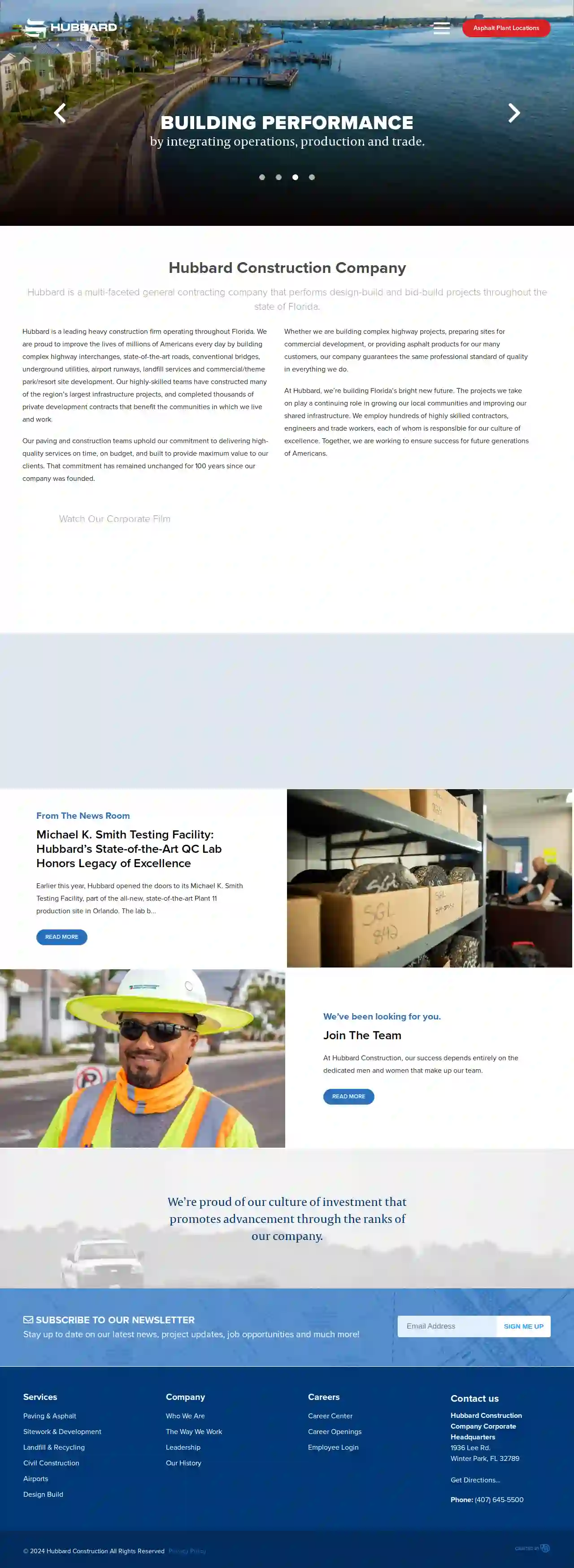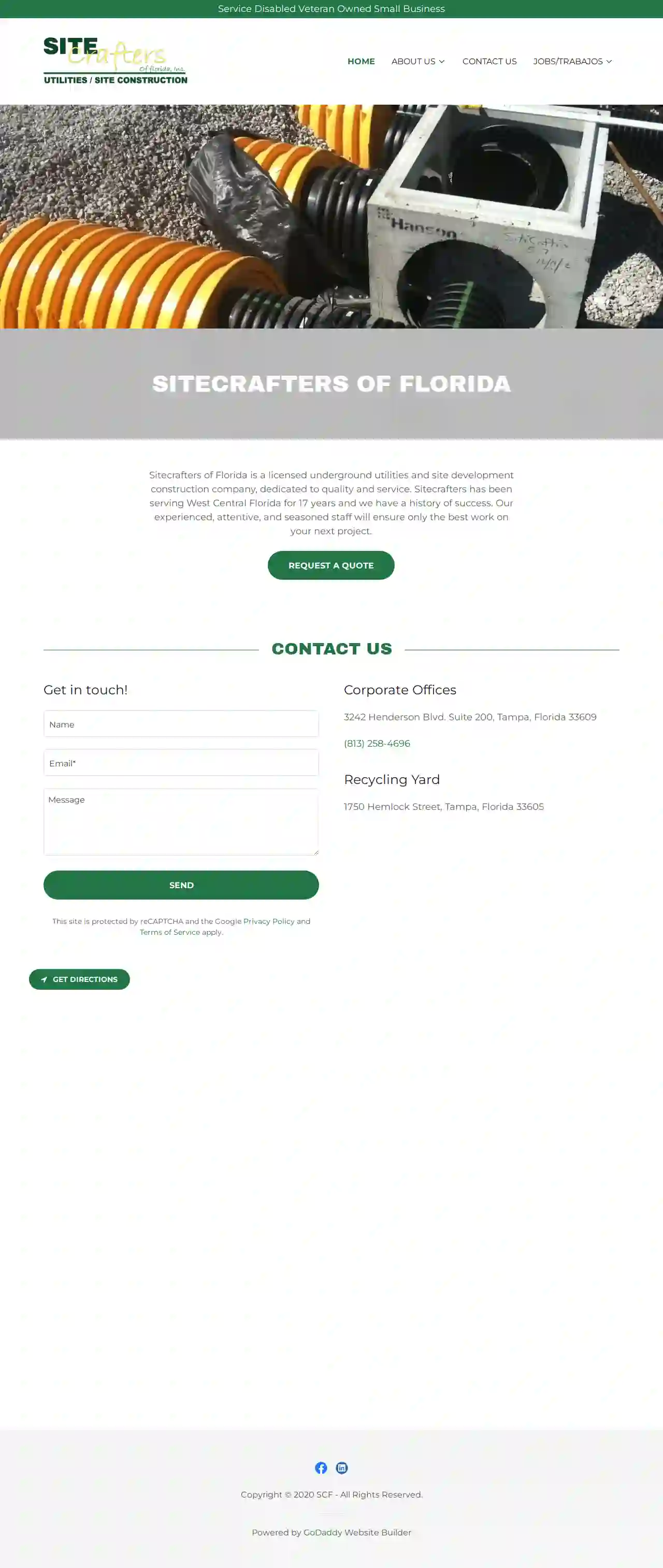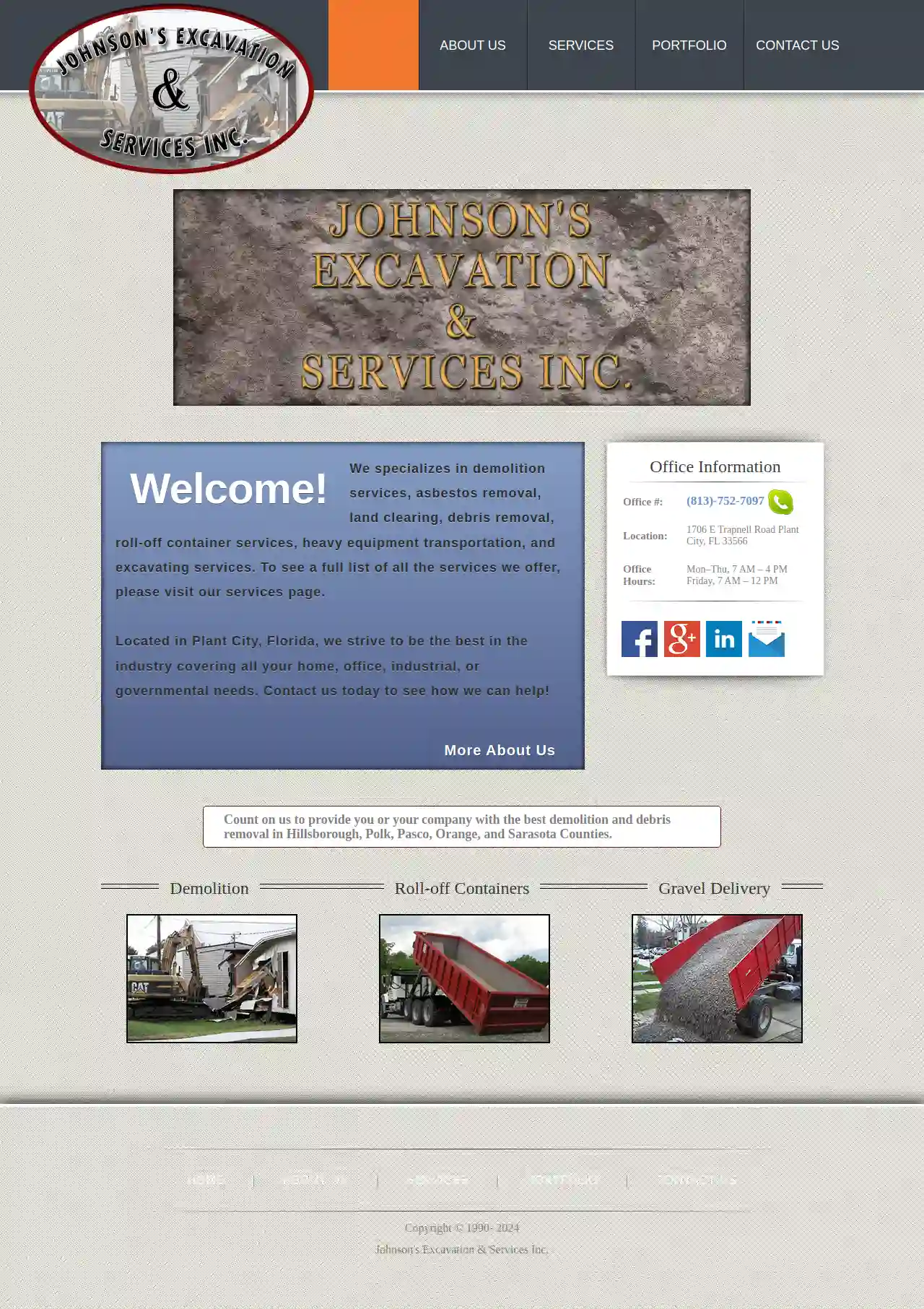Excavation Contractors Tampa
Find top Excavation Contractor in Tampa
Get 3 FREE Land Excavation quotes for your project today! Compare profiles, reviews, accreditations, portfolio, etc... and choose the best deal.

Hubbard Construction Co
4.543 reviews1936 Lee Rd., Winter Park, 32789, USBuilding Together with our clients, communities, and stakeholders. Building Leadership to take on tomorrow’s challenges. Building Performance by integrating operations, production and trade. Building Communities to thrive for generations to come. Hubbard is a multi-faceted general contracting company that performs design-build and bid-build projects throughout the state of Florida. Hubbard is a leading heavy construction firm operating throughout Florida. We are proud to improve the lives of millions of Americans every day by building complex highway interchanges, state-of-the-art roads, conventional bridges, underground utilities, airport runways, landfill services and commercial/theme park/resort site development. Our highly-skilled teams have constructed many of the region’s largest infrastructure projects, and completed thousands of private development contracts that benefit the communities in which we live and work. Our paving and construction teams uphold our commitment to delivering high-quality services on time, on budget, and built to provide maximum value to our clients. That commitment has remained unchanged for 100 years since our company was founded. Whether we are building complex highway projects, preparing sites for commercial development, or providing asphalt products for our many customers, our company guarantees the same professional standard of quality in everything we do. At Hubbard, we’re building Florida’s bright new future. The projects we take on play a continuing role in growing our local communities and improving our shared infrastructure. We employ hundreds of highly skilled contractors, engineers and trade workers, each of whom is responsible for our culture of excellence. Together, we are working to ensure success for future generations of Americans.
- Services
- Why Us?
- Gallery
Get Quote
SiteCrafters of Florida
4.54 reviews3242 Henderson Blvd., Suite 200, 3242 Henderson Blvd. Suite 200, Tampa, 33609, USSitecrafters of Florida Sitecrafters of Florida is a licensed underground utilities and site development construction company, dedicated to quality and service. Sitecrafters has been serving West Central Florida for 17 years and we have a history of success. Our experienced, attentive, and seasoned staff will ensure only the best work on your next project.
- Services
- Why Us?
- Gallery
Get Quote
Bucky's Tampa
3.73 reviewsTampa, US- Services
- Why Us?
Get Quote
Construction Services, Inc. of Tampa
51 reviewsTampa, US- Services
- Why Us?
Get Quote
Florida Landworx, LLC
5197 reviewsTampa, US- Services
- Why Us?
Get Quote
McKenzie Contracting, LLC
1Tampa, US- Services
- Why Us?
Get Quote
Johnson's Excavation & Services Inc
58 reviewsTampa, US- Services
- Why Us?
Get Quote
Fast Tracks Land Management
584 reviewsTampa, US- Services
- Why Us?
Get Quote
Over 3,943+ Excavation Contractors in our network
Our excavation pros operate in Tampa & beyond!
ExcavationHQ has curated and vetted the Best Excavation Businesses in Tampa. Find a reliable pro today.
Frequently Asked Questions About Excavation Contractors
- Planning and Surveying: Defining the excavation area, marking utility lines, and determining the required depth and grade.
- Site Preparation: Clearing vegetation, removing obstacles, and ensuring site accessibility.
- Excavation: Using appropriate equipment (excavators, backhoes, etc.) to remove earth and create the desired excavation.
- Hauling and Disposal: Transporting excavated material to designated disposal sites, complying with environmental regulations.
- Backfilling and Compaction: Refilling the excavation with suitable material and compacting it to achieve the required density and stability.
- Grading and Finishing: Leveling and shaping the surface to the final grade for landscaping or construction.
- Soil Type and Stability: Stable, cohesive soils allow for deeper excavations than loose or unstable soils.
- Groundwater Level: Excavations below the water table require dewatering techniques to manage water intrusion.
- Equipment and Resources: The size and capabilities of excavation equipment influence the achievable depth.
- Safety Regulations: OSHA and other safety regulations impose limitations on trench depths without proper shoring or sloping.
- Project Requirements: The purpose of the excavation (basement, pool, foundation) determines the necessary depth.
- Trench Collapses: Unstable trench walls can cave in, posing a severe risk to workers. Proper shoring and sloping are crucial safety measures.
- Utility Damage: Striking underground utilities (gas, water, electric) can cause leaks, explosions, or electrocution. Accurate utility locates and careful digging are essential.
- Falling Objects: Materials or equipment falling into excavations can injure workers. Securing work areas and using appropriate safety gear is vital.
- Equipment Accidents: Operating heavy machinery involves risks of rollovers, collisions, or mechanical failures. Trained operators and proper equipment maintenance are critical.
- Environmental Hazards: Excavated soil might contain hazardous materials (asbestos, lead). Proper testing and disposal procedures are necessary.
- Topsoil Removal: Stripping the fertile topsoil layer from a site, often preserving it for landscaping.
- Trench Excavation: Digging long, narrow trenches for utilities (pipes, cables) or foundations.
- Basement Excavation: Removing earth to create a space for a basement beneath a structure.
- Pool Excavation: Digging a precise hole for installing a swimming pool.
- Roadway Excavation: Removing earth and preparing the ground for road construction.
- Demolition Excavation: Clearing debris and preparing the site after demolition.
- Channel Excavation: Creating channels for drainage or irrigation.
What is the excavation process?
How deep can you excavate?
What are the risks associated with excavation?
What are the different types of excavation?
What is the excavation process?
- Planning and Surveying: Defining the excavation area, marking utility lines, and determining the required depth and grade.
- Site Preparation: Clearing vegetation, removing obstacles, and ensuring site accessibility.
- Excavation: Using appropriate equipment (excavators, backhoes, etc.) to remove earth and create the desired excavation.
- Hauling and Disposal: Transporting excavated material to designated disposal sites, complying with environmental regulations.
- Backfilling and Compaction: Refilling the excavation with suitable material and compacting it to achieve the required density and stability.
- Grading and Finishing: Leveling and shaping the surface to the final grade for landscaping or construction.
How deep can you excavate?
- Soil Type and Stability: Stable, cohesive soils allow for deeper excavations than loose or unstable soils.
- Groundwater Level: Excavations below the water table require dewatering techniques to manage water intrusion.
- Equipment and Resources: The size and capabilities of excavation equipment influence the achievable depth.
- Safety Regulations: OSHA and other safety regulations impose limitations on trench depths without proper shoring or sloping.
- Project Requirements: The purpose of the excavation (basement, pool, foundation) determines the necessary depth.
What are the risks associated with excavation?
- Trench Collapses: Unstable trench walls can cave in, posing a severe risk to workers. Proper shoring and sloping are crucial safety measures.
- Utility Damage: Striking underground utilities (gas, water, electric) can cause leaks, explosions, or electrocution. Accurate utility locates and careful digging are essential.
- Falling Objects: Materials or equipment falling into excavations can injure workers. Securing work areas and using appropriate safety gear is vital.
- Equipment Accidents: Operating heavy machinery involves risks of rollovers, collisions, or mechanical failures. Trained operators and proper equipment maintenance are critical.
- Environmental Hazards: Excavated soil might contain hazardous materials (asbestos, lead). Proper testing and disposal procedures are necessary.
What are the different types of excavation?
- Topsoil Removal: Stripping the fertile topsoil layer from a site, often preserving it for landscaping.
- Trench Excavation: Digging long, narrow trenches for utilities (pipes, cables) or foundations.
- Basement Excavation: Removing earth to create a space for a basement beneath a structure.
- Pool Excavation: Digging a precise hole for installing a swimming pool.
- Roadway Excavation: Removing earth and preparing the ground for road construction.
- Demolition Excavation: Clearing debris and preparing the site after demolition.
- Channel Excavation: Creating channels for drainage or irrigation.